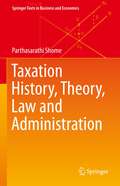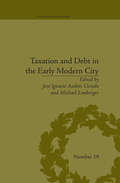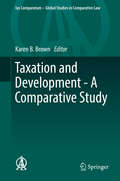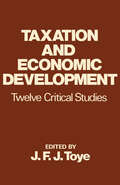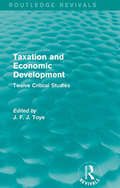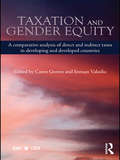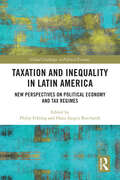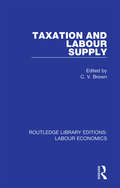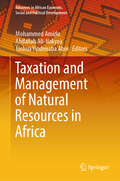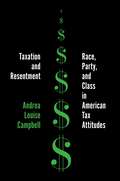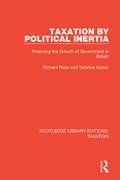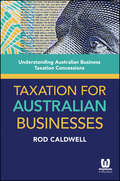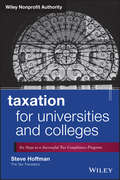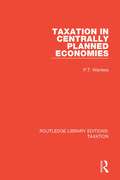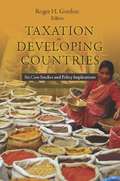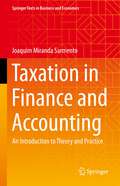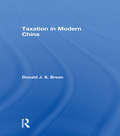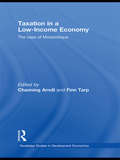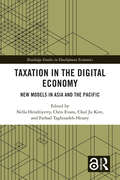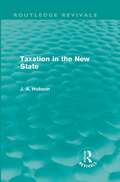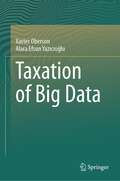- Table View
- List View
Taxation History, Theory, Law and Administration (Springer Texts in Business and Economics)
by Parthasarathi ShomeTax practitioners are unfamiliar with tax theory. Tax economists remain unfamiliar with tax law and tax administration. Most textbooks relate mainly to the US, UK or European experiences. Students in emerging economies remain unfamiliar with their own taxation history. This textbook fills those gaps. It covers the concept of taxes in regards to their rationale, principles, design, and common errors. It addresses distortions in consumer choices and production decisions caused by tax and redressals. The main principles of taxation—efficiency, equity, stabilization, revenue productivity, administrative feasibility, international neutrality—are presented and discussed. The efficiency principle requires the minimisation of distortions in the market caused by tax. Equity in taxation is another principle that is maintained through progressivity in the tax structure. Similarly, other principles have their own ramifications that are also addressed. A country’s constitutional specification of tax assignment to different levels of government—central, state, municipal—are elaborated. The UK is more centralised than the US and India. India has amended its constitution to introduce a goods and services tax (GST) covering both central and state governments. Drafting of tax law is crucial for clarity and this aspect is addressed. Furthermore, the author illustrates different types of taxes such as individual income tax, corporate income tax, wealth tax, retail sales/value added/goods and services tax, selective excises, property tax, minimum taxes such as the minimum alternate tax (MAT), cash-flow tax, financial transactions tax, fringe benefits tax, customs duties and export taxes, environment tax and global carbon tax, and user charges. An emerging concern regarding the inadequacy of international taxation of multinational corporations is covered in some detail. Structural aspects of tax administration are given particular attention.
Taxation and Debt in the Early Modern City (Financial History #19)
by José Ignacio Andrés Ucendo Michael LimbergerFiscal relations between states and cities in early modern Europe is a major concern for economic and financial historians. This collection of eleven essays is based on new research using documentary evidence from local and national archives from across Europe.
Taxation and Development - A Comparative Study
by Karen B. BrownThis volume examines the tax systems of some twenty countries to determine whether their tax laws are used to support growth and development across borders in lower-income and poor countries. Given the critical economic development needs of poorer countries and the importance of stability in these regions to the security of populations throughout the world, the use of a country's tax laws to support investment in the developing world gains crucial significance. This book explores whether international standards promoting the fundamental values of the major tax systems of the world accommodate incentives for these nations. In addition, it analyzes the way in which adoption of principles by higher income nations to protect their own revenue bases has a spill-over effect, impairing the ability of developing countries to sustain their economies. Following an introduction that synthesizes worldwide trends, the volume contains separate chapters for a variety of countries detailing the underlying goals and values of each system and the way in which the decision to employ (or not employ) incentives accommodates those ends. The chapters include reports for: Australia, Belgium, Brazil, Croatia, Czech Republic, France, Hong Kong, Israel, Italy, Japan, the Maldives, the Netherlands, Poland, Portugal, South Africa, Uganda, United Kingdom, United States, and Venezuela. The volume memorializes the work of the General Reporter and National Reporters at the Taxation and Development session of the 19th Congress of the International Academy of Comparative Law held in July, 2014, in Vienna, Austria.
Taxation and Economic Development: Twelve Critical Studies (Routledge Revivals Ser.)
by John ToyeFirst published in 1978. The tax system is one of the instruments said to be available to translate development policy objectives into practice. The wide-ranging papers collected together in this volume, first published in 1978, explore different aspects of the link between national development objectives and the tax system. Attention is particularly focused on traditional aims such as growth, fair distribution and economic stabilisation and development. Articles written by distinguished experts in the fields of public finance and economic development clarify the concepts of taxable capacity and tax effort, and examine the connections between growth and changes within the tax system.
Taxation and Economic Development: Twelve Critical Studies (Routledge Revivals)
by John F. ToyeThe tax system is one of the instruments said to be available to translate development policy objectives into practice. The wide-ranging papers collected together in this volume, first published in 1978, explore different aspects of the link between national development objectives and the tax system. Attention is particularly focused on traditional aims such as growth, fair distribution and economic stabilisation and development. Articles written by distinguished experts in the fields of public finance and economic development clarify the concepts of taxable capacity and tax effort, and examine the connections between growth and changes within the tax system.
Taxation and Gender Equity: A Comparative Analysis of Direct and Indirect Taxes in Developing and Developed Countries (Routledge International Studies in Money and Banking)
by Caren GrownAround the world, there are concerns that many tax codes are biased against women, and that contemporary tax reforms tend to increase the incidence of taxation on the poorest women while failing to generate enough revenue to fund the programs needed to improve these women’s lives. Because taxes are the key source of revenue governments themselves raise, understanding the nature and composition of taxation and current tax reform efforts is key to reducing poverty, providing sufficient revenue for public expenditure, and achieving social justice. This is the first book to systematically examine gender and taxation within and across countries at different levels of development. It presents original research on the gender dimensions of personal income taxes, and value-added, excise, and fuel taxes in Argentina, Ghana, India, Mexico, Morocco, South Africa, Uganda and the United Kingdom. This book will be of interest to postgraduates and researchers studying Public Finance, International Economics, Development Studies, Gender Studies, and International Relations, among other disciplines.
Taxation and Inequality in Latin America: New Perspectives on Political Economy and Tax Regimes (Global Challenges in Political Economy)
by Philip Fehling and Hans-Jürgen BurchardtTaxation and Inequality in Latin America takes a heterodox political economy approach, focusing on Latin America, where current problems of taxation have existed for a century and great wealth contrasts with abject poverty. The book analyzes the relation of natural resource wealth, allocational politics and the limited role of taxation for redistribution, and progressive resource mobilization. By drawing on the political economy of tax regimes, the book considers the specific conditions of taxation in Latin America, which apply to a large part of the Global South and more than 100 countries specializing in the extraction and export of raw materials. This book will cover: taxation and the dominance of raw material export sectors; taxation and allocational politics; new perspectives on political economy and tax regimes. Scholars and advanced students of political economy, political science, development studies, and fiscal sociology will find several key issues in tax research from a novel angle. The book provides an analytical orientation that relates central questions of taxation to patterns of regional political economy, thereby opening up the debate with tax scholars from other world regions of the Global South.
Taxation and Labour Supply (Routledge Library Editions: Labour Economics #5)
by C. V. BrownFirst published in 1981. This book reports on a decade of research into the effects of taxation on the supply of labour. In addition to their work in making labour supply estimates, the study explores a number of the ways labour supply estimates can be used. When budget constraints are non-linear it is not possible to estimate the effects of (tax) or other policy changes from knowledge of labour supply elasticities alone, and it is necessary to re-estimate the original model used to derive the estimates. The implications of labour supply estimates for the study of inequality and optimal taxation are considered. Macro-economic models of the economy typically omit labour supply functions or include functions which are inconsistent with micro-economic work on labour supply. This book will appeal to academic economists, senior students and policy-makers in the field of public finance and labour economics, who will find much of interest from both the theoretical and policy standpoints.
Taxation and Management of Natural Resources in Africa (Advances in African Economic, Social and Political Development)
by Joshua Yindenaba Abor Mohammed Amidu Abdallah Ali-NakyeaThis book offers a comprehensive examination of the fundamental concepts and principles crucial to the taxation and management of natural resources, specifically tailored to the unique challenges faced by developing African countries. It delves into the key instruments that comprise a resource tax policy, providing invaluable insights into the tax reforms necessary to maximize economic rent for African nations. Written by experts in the field, this book explores the potential application of effective revenue management principles by African governments to achieve desired developmental outcomes. It covers a wide range of topics, including socio-political risks, ethical dilemmas, accountability and transparency, resource rent and capital gains taxes, tax administration and reforms, taxation of oil and gas revenue, environmental taxation, globalization's impact, and the promotion of inclusive development. Designed for scholars, tax professionals, and individuals interested in natural resources management and revenue mobilization strategy in Africa, this book bridges the gap between theory and practice, providing valuable insights and recommendations for sustainable and responsible management of Africa's rich natural resources.
Taxation and Resentment: Race, Party, and Class in American Tax Attitudes
by Andrea Louise CampbellWhy Americans favor progressive taxation in principle but not in practiceMost Americans support progressive taxation in principle, and want the rich to pay more. But the specific tax policies that most favor are more regressive than progressive. What is behind such a disconnect? In this book, Andrea Louise Campbell examines public opinion on taxation, exploring why what Americans favor in principle differs from what they accept in practice. Campbell shows that since the federal income tax began a century ago, the rich have fought for lower taxes through reduced rates and a complicated system of tax breaks. The resulting complexity leaves the public confused about who benefits from the convoluted tax code, and leads to tax preferences that are driven by factors other than principles or interests.Campbell argues that tax attitudes vary little by income, or by party, as some Democrats, more Republicans, and even more independents want most taxes decreased. Instead, white opinion on nearly every tax is racialized. Many do not realize the rich benefit the most from tax breaks, attitudes toward which are racialized, too. And among Black and Hispanic Americans, long subject to government coercion, greater support for government spending is not matched by greater support for taxation. Everyone has a reason to dislike taxes, which helps antitax Republicans win votes—and helps the rich in their long campaign to get their own taxes reduced and undermine progressivity.
Taxation and Society in Twentieth-Century Argentina (Studies of the Americas)
by José Antonio Sánchez RománThis book provides a historical narrative of the Argentine tax system in the twentieth century. It argues that the failure to build permanent trust between the state and the civil society and the unraveling of confidence within Argentine society itself account for the collapse of the progressive tax system.
Taxation and the Household Saving Rate: Evidence from OECD Countries
by Vito Tanzi Howell H. ZeeA report from the International Monetary Fund.
Taxation by Political Inertia: Financing the Growth of Government in Britain (Routledge Library Editions: Taxation #8)
by Richard Rose Terence KarranThis book, first published in 1987, is a study of the political processes that underlie the determination of taxation – and much else – in the centuries-old government of Britain. Governments inherit a large legacy of policies, and it is the inertia force of past commitments that determine much of what a government does. This is especially true of taxation, and this book explores the forces at work on the policies of taxation. It also helps us understand what might be the future of taxation.
Taxation for Australian Businesses: Understanding Australian Business Taxation Concessions
by Rod CaldwellSimplify tax and save money with streamlined bookkeeping Small businesses are often just that--small. <P><P>Bookkeepingmay be done by a professional outside the company, but more oftenfalls to an employee or the business owner, who may or may not bewell-schooled in the intricacies of tax law and businessregulations. Tax time can end up costing small businesses a fortunein either professional fees or missed deductions every year. Whatif you could simplify the process and save money?Taxation for Australian Businesses: Understanding AustralianBusiness Taxation Concessions is the ultimate guide to taxfor the small business owner. Author Rod Caldwell, 20-year veteranof the Australian Taxation Office, leads you through the process ofmanaging your books and keeping more straightforward records tosimplify the process of filing tax. The introduction of the GST andthe new tax system involves a lot of new work for business owners,but Taxation for Australian Businesses eases the way byexplaining the intricacies of applicable tax law, fully updated toparallel the May 2014 budget. Topics include:Business structures, accounting systems, and cashaccountingFBT, private versus domestic use, and when to record apaymentMotor vehicles, the GST, and depreciationOwners salary, end of period processing, and how to account forstock tradingThe book explains everything you need to know and ties it alltogether to show you how to put the information into practice. Nojargon, no textbooks, just common sense and reason. If you wouldlike to get your bookkeeping straightened out and get back to yourbusiness, Taxation for Australian Businesses: UnderstandingAustralian Business Taxation Concessions is the one guide thatwill get you there quickly.
Taxation for Universities and Colleges
by Steve HoffmanThe "Tax Translator" offers much needed advice and guidance on tax compliance for institutions of higher learningCollege and university officials often are unaware of their institutions' tax obligations. Especially for institutions without designated tax compliance officers, the consequences of such ignorance can devastating. Based on its author's decades of experiences as a tax manager at three universities, this handbook was written for all university staff involved with tax compliance--from the account clerk in the Accounts Payable Department, up through vice presidents, controllers, treasurers and directors. Steve Hoffman explains the core principles and practices that inform current tax policy and develops a framework for building a system for effective tax compliance, reporting and filing. Satisfies the urgent demand for timely, authoritative advice and guidance on a area of increasing concern for colleges and universitiesSheds new light on the impact of current tax obligations for both four-year and community colleges, which are often left out of the discussionThe Federal Government has recently stepped up its enforcement of tax law compliance for colleges and universities
Taxation in ASEAN and China: Local Institutions, Regionalism, Global Systems and Economic Development (Routledge Studies in the Growth Economies of Asia)
by Nolan Cormac SharkeyChina and the ASEAN region have risen rapidly to a position of immense economic significance in the global economy. Academics, policy makers and businesses are all keen to understand more about taxation in China and ASEAN, and this work seeks to address this key issue by providing a comprehensive overview of the many often mentioned but little understood challenges of doing business in the region. Traversing a wide range of regional issues and jurisdictions, topics covered include the role of DTAs in regional integration, the impact of social institutions on tax, corruption and its causes, economic development and taxation and the use of education in developing systems. Case studies are taken from countries such as China, Vietnam, Hong Kong, Singapore, the Philippines, Malaysia and Indonesia. Drawing on the results of these discussions, the book also sheds light on the question of whether different taxing institutions are needed in the region. Gathering together a cross-disciplinary group of eminent scholars, this work will be of great interest to all students and scholars of Asian economics, Asian finance and taxation in general.
Taxation in Centrally Planned Economies (Routledge Library Editions: Taxation #9)
by P.T. WanlessEconomists studying comparative economic systems have generally neglected the important question of taxation in socialist countries. This is somewhat surprising since taxation plays an important role in the regulation of economic activity in these countries. This book, first published in 1985, aims to restore the study of taxation to its rightful role in comparative economic studies. It stresses the importance of taxation and the state budget and argues that these are tools of economic policy which complement central economic planning.
Taxation in Colonial America
by Alvin RabushkaTaxation in Colonial America examines life in the thirteen original American colonies through the revealing lens of the taxes levied on and by the colonists. Spanning the turbulent years from the founding of the Jamestown settlement to the outbreak of the American Revolution, Alvin Rabushka provides the definitive history of taxation in the colonial era, and sets it against the backdrop of enormous economic, political, and social upheaval in the colonies and Europe. Rabushka shows how the colonists strove to minimize, avoid, and evade British and local taxation, and how they used tax incentives to foster settlement. He describes the systems of public finance they created to reduce taxation, and reveals how they gained control over taxes through elected representatives in colonial legislatures. Rabushka takes a comprehensive look at the external taxes imposed on the colonists by Britain, the Netherlands, and Sweden, as well as internal direct taxes like poll and income taxes. He examines indirect taxes like duties and tonnage fees, as well as county and town taxes, church and education taxes, bounties, and other charges. He links the types and amounts of taxes with the means of payment--be it gold coins, agricultural commodities, wampum, or furs--and he compares tax systems and burdens among the colonies and with Britain. This book brings the colonial period to life in all its rich complexity, and shows how colonial attitudes toward taxation offer a unique window into the causes of the revolution.
Taxation in Developing Countries: Six Case Studies and Policy Implications (Initiative for Policy Dialogue at Columbia: Challenges in Development and Globalization #No. 26)
by Roger GordonTaxes are a crucial policy issue, especially in developing countries. Just recently, proposals to raise middle-class taxes toppled the Bolivian government, and plans to extend or increase the value-added tax caused political unrest in Ecuador and Mexico. Despite the impact of tax policy on developing countries, a comprehensive study has yet to be written. Treating Argentina, Brazil, India, Kenya, Korea, and Russia as key case studies, this volume outlines the major aspects of current tax codes and explores their economic and political implications. Examples of both the poorest and wealthiest developing countries, Argentina, Brazil, India, Kenya, Korea, and Russia uniquely demonstrate the diverse fiscal problems of tax reform. Each economy relies heavily on indirect and corporate income taxes, though recently some have reduced their tariff rates and have switched from excise to value-added taxes. There is a large, informal economy in most of these countries, and tax evasion by firms is a significant concern. As a result, tax revenue remains low, even though rates are as high as those in developed economies. Also, unconventional methods to collect revenue have been implemented, including bank debit taxes, state ownership of firms, and implicit taxes on individuals in the informal sector. Exploring these and other concerns, as well as changes in tax law, administration, and fiscal pressures, this comprehensive anthology clarifies the current landscape of tax administration and the economic future of the world's poorer economies.
Taxation in Finance and Accounting: An Introduction to Theory and Practice (Springer Texts in Business and Economics)
by Joaquim Miranda SarmentoTaxation is becoming more and more relevant for firms and managers decisions, mainly due to the impacts of taxation on firms and projects performance, profitability and value. This book provides an introductory overview of taxation in the fields of finance and accounting. It covers several fundamental topics of taxation, such as income, corporate and value add tax, and tax planning and management, international taxation, EU tax harmonization and transfer prices. This book intends to provide the readers with an understanding of the main concepts and principles of these topics, regardless of specific country contexts in law. With this book, readers will be able to understand the fundamentals of taxation at a conceptual and practical level. By using theory and practical examples, readers will understand taxation at a broader level, without being concerned about country-specific issues.
Taxation in Modern China
by Donald J.S. BreanTaxation in Modern China is concerned with tax and public financial issues arising in China's economic transition. The contributors, among the leading authorities on public finance, transitional economics and policy reform in China, direct attention to the largest and most comprehensive fiscal reform program in modern history. The essays collected here cover the main institutional, intergovernmental and industrial issues and address the long-term challenges facing China as well as transitional changes.
Taxation in a Low-Income Economy: The case of Mozambique (Routledge Studies in Development Economics)
by Finn Tarp Channing ArndtThis volume contains a stimulating collection of analytical studies focusing on taxation in Mozambique. It tells a compelling story about tax systems in a low income economy increasingly integrated into the world trading system, but very much dependent on foreign trade taxes and international development assistance. Key issues covered include: A better understanding of the historical background of tax reforms in a representative African economy (Mozambique) along with an assessment of taxation performance in a comparative perspective. Insights into the practice and implications of tax policy, both from the perspective of the consumer and the firm level. Discussion of the existing institutional set up in which tax policy and its enforcement operate and analyses of current tax practices. Taxation themes at the border and at domestic level, which are typical for low-income economies, characterized by a high degree of reliance on foreign trade taxes. This volume is meant as a guide for developing country government officials and professional aid practitioners as well as academics, researchers and tax policy analysts working in the development field. It will also be of interest to students of development with a special interest in public finance issues in poor countries and how to improve policy-effectiveness, including tax policy, in a developing country setting.
Taxation in the Digital Economy: New Models in Asia and the Pacific (Routledge Studies in Development Economics)
by Nella Hendriyetty, Chris Evans, Chul Ju Kim, and Farhad Taghizadeh-HesaryA robust and efficient tax administration in a modern tax system requires effective tax policies and legislation. Policy frameworks should cover all aspects of tax administration and include the essential processes of capturing, processing, analyzing, and responding to information provided by taxpayers and others concerning taxpayers’ affairs. By far the greatest challenges facing tax administrations in all countries are those posed by the continuing developments in the digital economy. Whereas societies are grappling to come to terms with the transitions from the third industrial or digital revolutions, revenue authorities grapple with the consequences for the sustainability of their tax bases and the efficient administration and collection of taxes. This book presents a critical review of the status of tax systems in Asia and the Pacific in the era of the digital economy. The book suggests how countries can maximize their domestic resource mobilization when confronted by the challenges that digitalization inevitably produces, as well as how they can best harness or take advantage of aspects of digitalization to serve their own needs. The full implications of the COVID-19 crisis are still too uncertain to predict, but it is clear that the crisis will accelerate the trend towards digitalization and also increase pressures on public finances. This, in turn, may shape the preference for, and the nature of, both multilateral and unilateral responses to the tax challenges posed by digitalization and the need to address them. This book will be a timely reference for those researching on taxation in digital economy and for policy makers.
Taxation in the New State (Routledge Revivals)
by J A HobsonFirst published in 1919, Taxation in the New State explores the practical application of tax policy to the financial situation of post-World War I Britain. Hobson assesses policy according to the tax payer’s ability to bear the burden and draws a distinction between ‘cost’ and ‘surplus’. He proposes a number of reforms and considers the pitfalls of attempting the find required revenue using ordinary taxation in a post-war financial crisis.
Taxation of Big Data
by Alara Efsun Yazıcıoğlu Xavier ObersonThis book has the merit of being the first book analysing different aspects of data taxation from a wide perspective encompassing not only tax law but also other significant issues related to data, such as data protection and economic inefficiencies. The main aim is to provide data-specific solutions to data-driven problems. In the midst of a number of critical issues and a great deal of uncertainty currently reigning in the field, the authors attempt to put forward easy-to-implement and efficient proposals on the basis of an interdisciplinary analysis. The core idea of this book consists of segregating the utilisation of data into four different yet interdependent steps and constructing the tax law analysis on top of these four corner stones. Step one, occurring in the generation and collection phases of the data’s life cycle, comprises ‘the digital barter’ and other collection of data. Step two, taking place during the processing and analytics phases of the data’s life cycle, consists of microwork. Step three, situated in the storage, processing, analytics and use phases of the data’s life cycle, encompasses aggregation and internal use of data. Step four, materialising during the distribution and use phases of the data’s life cycle, covers sale of data, transfer of data and granting the right to use a database. The main issues occurring in each of the four steps are analysed separately, and yet interdependently, with an emphasis on international tax law. The book also comprises a VAT analysis; suggestion of a new type of tax, namely «data collection tax»; and a brief opinion on a potential future «robo-data tax». The subjects explored in this book are of interest for researchers, lawyers as well as tax administrations. Albeit being an academic publication, the developments made in this contribution are also relevant for the general public. After all, data, the youngest intangible, constitute the raw material of the fourth industrial revolution; and their use and taxation affect each and every citizen!
